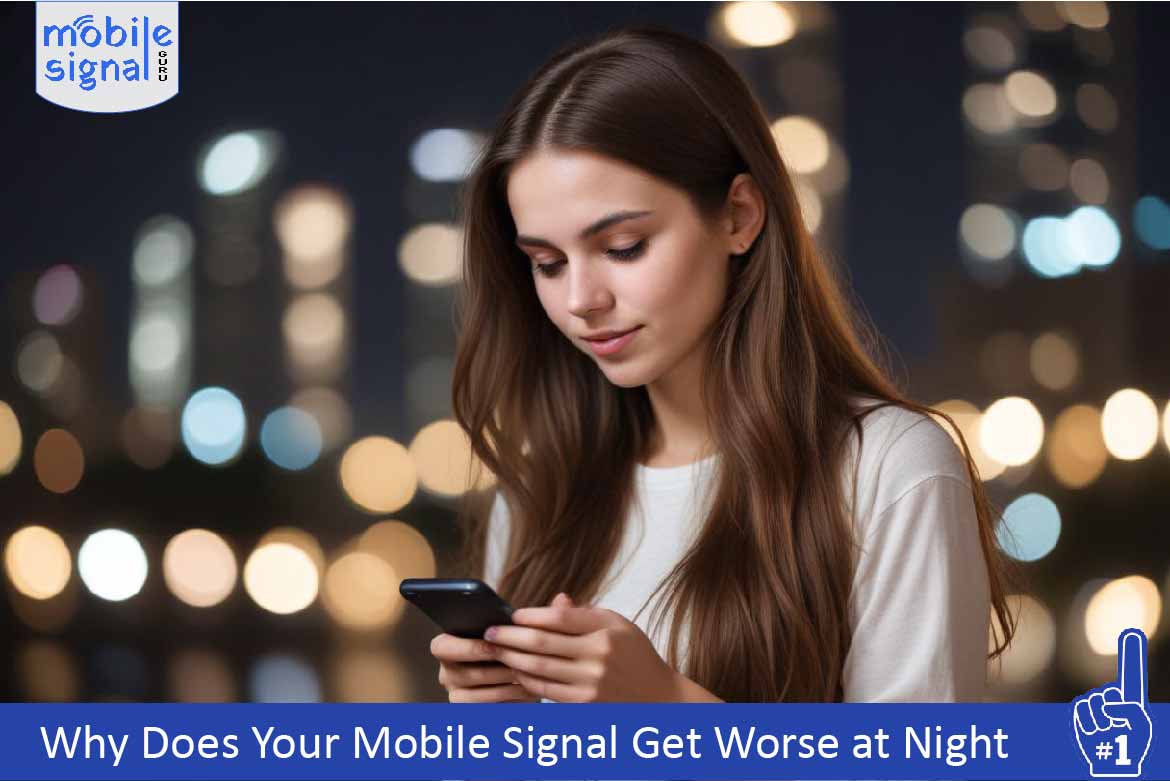Have you ever noticed that your mobile signal seems weaker at night? You may experience dropped calls, slower internet speeds, or poor connectivity after the sun goes down. While this can be frustrating, there are several reasons why mobile signal get worse at night.
In this article, we’ll explore the main causes behind why mobile signal get worse at night and how you can improve your mobile signal, ensuring better connectivity, even at night.
1. Increased Network Traffic
One of the most common reasons for a weaker mobile signal at night is increased network traffic. More people tend to use their phones during the evening to stream videos, browse social media, or chat with friends. As more users connect to the same cell tower, the available bandwidth is shared, which can slow down the network.
When too many users are connected to a single tower, the mobile signal strength weakens. This can lead to slower internet speeds, dropped calls, and difficulty sending texts. During peak hours, between 7 p.m. and 10 p.m., mobile networks often experience higher traffic, which can negatively impact your signal reception and connectivity.
Solution: To avoid congestion, try using your phone during off-peak hours or connect to a Wi-Fi network whenever possible.
2. Environmental Factors
At night, environmental factors can also impact your mobile signal. Mobile signals travel as radio waves, which can be influenced by atmospheric conditions. As temperatures drop at night, the air density changes, which can affect how signals travel. Dense, cooler air can sometimes block or interfere with signal transmission, especially in areas with poor reception to begin with.
In addition, obstacles such as buildings, trees, or mountains can further disrupt mobile signals, especially if you’re indoors. These obstacles can block signals more effectively when the atmospheric conditions are less favorable.
Solution: Placing your phone near a window or moving to an open area can help improve signal reception if you’re indoors.
3. Power Adjustments by Network Providers
At night, some mobile network providers adjust the power output of their cell towers. This can happen because fewer people are expected to use the network in certain areas during late-night hours. As a result, towers may operate at reduced power to conserve energy, which can lead to a weaker signal for users still awake and active at night.
This doesn’t happen with all network providers, but it’s more common in rural or less populated areas where the demand for mobile services decreases significantly at night.
Solution: If your mobile signal consistently worsens at night due to power adjustments, consider contacting your service provider to discuss possible solutions, or invest in a mobile signal booster.
4. Network Maintenance
Network maintenance is often carried out during late-night hours to minimize disruption for users. Mobile service providers may perform upgrades or repairs on cell towers, temporarily reducing signal strength in some areas. These maintenance activities can cause a noticeable drop in signal quality during the night.
While network maintenance is necessary to ensure better service in the long run, it can be inconvenient when you experience poor reception at night.
Solution: If you notice a regular drop in signal during the same time every night, your network provider may be conducting scheduled maintenance. Contact them to confirm, or check for network updates on their website.
5. Distance from the Cell Tower
The distance between your phone and the nearest cell tower can affect your signal strength at any time of day. However, this issue can feel worse at night when atmospheric changes and network adjustments further weaken the signal. The farther away you are from a cell tower, the weaker your signal will be.
In urban areas, cell towers are more densely placed, so this issue may not be as noticeable. However, in rural or remote areas, you may already experience weak signals, which can feel even worse during the night due to other contributing factors.
Solution: Use mobile apps or websites to locate the nearest cell tower and try to position yourself closer to it for better reception. A mobile signal booster can also help strengthen weak signals.
6. Phone Settings and Battery Life
Sometimes, your phone settings can contribute to poor signal quality at night. If your phone is set to power-saving mode, it may automatically reduce the signal strength to conserve battery life. Additionally, low battery levels can affect the phone’s ability to connect to distant towers, resulting in a weaker signal.
As your phone tries harder to connect to a distant cell tower, it uses more power, which can drain the battery even faster, causing a further drop in signal quality.
Solution: Ensure your phone is fully charged, and disable power-saving features if you’re experiencing poor reception at night.
7. Interference from Other Devices
At night, you may have more electronic devices active in your home, such as Wi-Fi routers, Bluetooth speakers, or smart home devices. These devices can create interference with mobile signals, especially if they operate on similar frequencies. This interference can cause your mobile signal to weaken or fluctuate, making it difficult to maintain a strong connection.
Solution: Reduce interference by keeping electronic devices away from your phone, or turn off unused devices to minimize signal disruption.
How to Improve Your Mobile Signal at Night
If you often experience weak mobile signals at night, there are a few steps you can take to improve reception:
- Use Wi-Fi Calling: Many mobile networks offer Wi-Fi calling, which allows you to make calls and send texts over a Wi-Fi connection instead of relying on your mobile signal.
- Install a Signal Booster: A mobile signal booster can amplify weak signals in your home or office, providing stronger reception and better connectivity.
- Move to Higher Ground: Elevating your phone or moving closer to a window can help reduce interference and improve signal strength.
- Upgrade Your Plan or Provider: If your mobile signal is consistently weak at night, consider upgrading to a better plan or switching to a provider with stronger coverage in your area.
Conclusion
Your mobile signal can get worse at night for several reasons, including increased network traffic, environmental factors, and power adjustments by network providers. Understanding these causes can help you take steps to improve your signal and stay connected.
By using Wi-Fi calling, installing a signal booster, or adjusting your phone settings, you can enjoy a better mobile experience, even after dark.
 Australia (AUD)
Australia (AUD) Denmark (DKK)
Denmark (DKK) France (EUR)
France (EUR) Germany (EUR)
Germany (EUR) Ireland (EUR)
Ireland (EUR) Malta (EUR)
Malta (EUR) Netherlands (EUR)
Netherlands (EUR) New Zealand (NZD)
New Zealand (NZD) Norway (NOK)
Norway (NOK) Spain (EUR)
Spain (EUR) Sweden (SEK)
Sweden (SEK) UAE (AED)
UAE (AED) United Kingdom (GBP)
United Kingdom (GBP)
